Cambodia elections: Elections begin in the Southeast Asian country where boycotting is a crime
 |
www.latimes.com |
People in Cambodia began voting in national elections on Sunday (Jul 23) as longtime leader Hun Sen neared the end of his fourth decade in office.
Voters in the capital Phnom Penh expect the ruling Cambodian People's Party (CPP) to win back all 125 Senel seats in the Senel3:SenelH 8-year parliament.
He did not face any real opposition as the only major challenger the media deemed credible was his disqualification in May.
Critics termed the election as mere fiction. Several Western countries, including the United States, have expressed concern about the fairness of the election. During his re-election campaign,
Hun Sen indicated that this may be his last term in office as he intends to hand over control to his eldest son, Hun Manet, who now commands the Royal Cambodian Army.
These designations raised questions about the state of democracy under Hun Sen. When the United States helped transform the post-war Na190 democracy into a civilian Khmer Rouge government, Hun Sen's party won all six national elections every five years.
He managed to consolidate his power by controlling the army, police, and influential interests, neutralizing opponents by various methods such as co-optation, imprisonment, or exile.
Cambodia Election:
An election boycott is a crime aimed at increasing voter turnout, reducing election boycotts, subduing the main electoral opposition despite the lack or absence of criminal opposition,
The Candlelight Party has further consolidated Hun Sen's power after winning strong support in the last local elections.
Cambodian election:
How many parties are participating in the election? A total of 17 other parties are participating in this year's election.
Since they are mostly small, new parties or parties affiliated with the ruling party, they are unlikely to present a credible challenge.








0 Comments